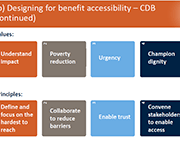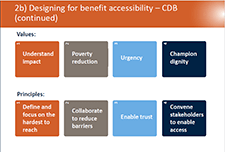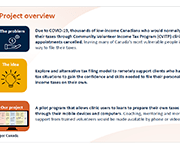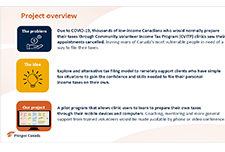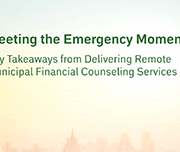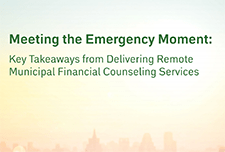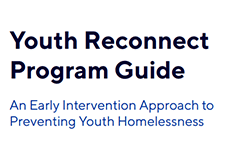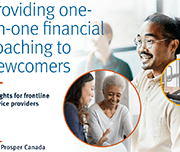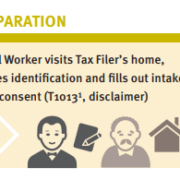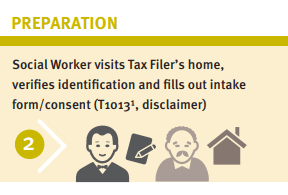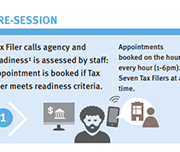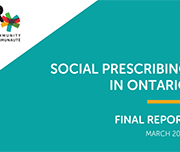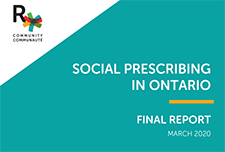Resources
Presentation slides and video time stamps
Read the presentation slides for this webinar.
Time stamps for the video recording:
-
- 5:20 – Start
- 6:12 – Land acknowledgement
- 7:24 – Introduction of speakers
- 9:42 – Today’s presentation
- 10:45 – Barriers to access to benefits
- 15:12 – Designing for benefit accessibility
- 21:53 – ESDC pilot project
- 32:46 –Demo of the disability benefit compass
- 44:36 – Importance of evaluation
- 50:58 – What’s next? What’s possible?
- 58:55 – Questions
Resources
Handouts, slides, and video time-stamps
Read the presentation slides for this webinar.
Download the handout for this webinar: Process map: Virtual Self-File model overview
Time-stamps for the video recording:
4:01 – Agenda and introductions
5:59 – Audience polls
10:27 – Project introduction (Speaker: Ana Fremont, Prosper Canada)
14:31 – Tour of TurboTax for Tax Clinics (Speaker: Guy Labelle, Intuit)
17:59 – Woodgreen project pilot (Speaker: Ansley Dawson, Woodgreen Community Services)
27:35 – EBO 2-step process (Speaker: Marc D’Orgeville, EBO)
39:26 – Woodgreen program modifications (Speaker: Ansley Dawson, Woodgreen)
46:03 – Q&A
Meeting the Emergency Moment: Key Takeaways from Delivering Remote Municipal Financial Counseling Services
Local governments across the United States are working to help their residents weather the health and financial impacts of the COVID-19 pandemic. In many cities and counties, that means deploying their Financial Empowerment Centers (FECs), which provide professional, one-on-one financial counseling as a public service. Local leaders were able to offer FEC financial counseling as a critical component of their emergency response infrastructure; the fact that this service already existed, and was embedded into the fabric of municipal anti-poverty efforts, meant that it could quickly pivot to meet new COVID-19 needs, including through offering remote financial counseling. This brief describes how FEC partners identified the right technology; developed skills to deliver counseling remotely; messaged the availability of FEC services as part of their localities’ COVID-19 response; and shared lessons learned with their FEC counterparts around the country.
Youth Reconnect Program Guide: An Early Intervention Approach to Preventing Youth Homelessness
Since 2017, the Canadian Observatory on Homelessness and A Way Home Canada have been implementing and evaluating three program models that are situated across the continuum of prevention, in 10 communities and 12 sites in Ontario and Alberta. Among these is an early intervention called Youth Reconnect. This document describes the key elements of the YR program model, including program elements and objectives, case examples of YR in practice, and necessary conditions for implementation. It is intended for communities who are interested in pursuing similar early intervention strategies. The key to success, regardless of the approaches taken, lies in building and nurturing community partnerships with service providers, educators, policy professionals, and young people.
Providing one-on-one financial coaching to newcomers: Insights for frontline service providers
One-on-one financial help is a key financial empowerment (FE) intervention that Prosper Canada is working to pilot, scale and integrate into other social services, in collaboration with FE partners across the country. FE is increasingly gaining traction as an effective poverty reduction measure. FE interventions include financial coaching and supports that assist people to build money management skills, access income benefits, tackle debt, learn about safe financial products and services and find ways to save for emergencies. This report shares insights on providing one-on-one financial coaching to newcomers captured through two financial coaching pilot projects that Prosper Canada conducted in collaboration with several frontline community partners.
Virtual tax filing: Piloting a new way to file taxes for homebound seniors
WoodGreen Community Services, a large multi-service frontline social service agency in Toronto, provides free tax preparation services year-round to people living on low incomes. WoodGreen was interested in designing a novel solution to address the tax filing needs of homebound seniors who are unable to access WoodGreen’s free in-person tax-preparation services due to physical or mental health challenges. Specifically, WoodGreen wanted to know… How might we provide high-quality professional tax preparation services to all clients whether or not they are onsite? Prosper Canada and a leading commercial tax preparation software company partnered with WoodGreen Community Services in order to answer this design question.
English
Supported self-file process maps: English
French
Social Prescribing in Ontario
Research has shown that even short-term isolation can have long-term impacts to mental health. Social and community supports are essential for vulnerable persons, especially during times of severe impacts to routine and imposed social distancing. This report discusses the findings of the Rx: Community - Social Prescribing in Ontario pilot, using social prescribing as a tool to better connect social and clinical care and broaden the definition of health and well-being.
A Much Closer Look: Enhancing Savings Counseling at Financial Empowerment Centers
Building savings is a fundamental strategy for empowering individuals and families with low incomes. Even relatively small amounts of savings can serve as a buffer against inevitable financial shocks that can otherwise undermine social service efforts and successes – and short-term savings offer realistic first steps toward building longer-term savings and acquiring assets. The CFE Fund conducted a research pilot at municipal Financial Empowerment Centers to better understand how clients are saving, and inform new savings indicators for financial counseling success. This report explains the insights of this research pilot, and client outcomes in savings and goal setting.

